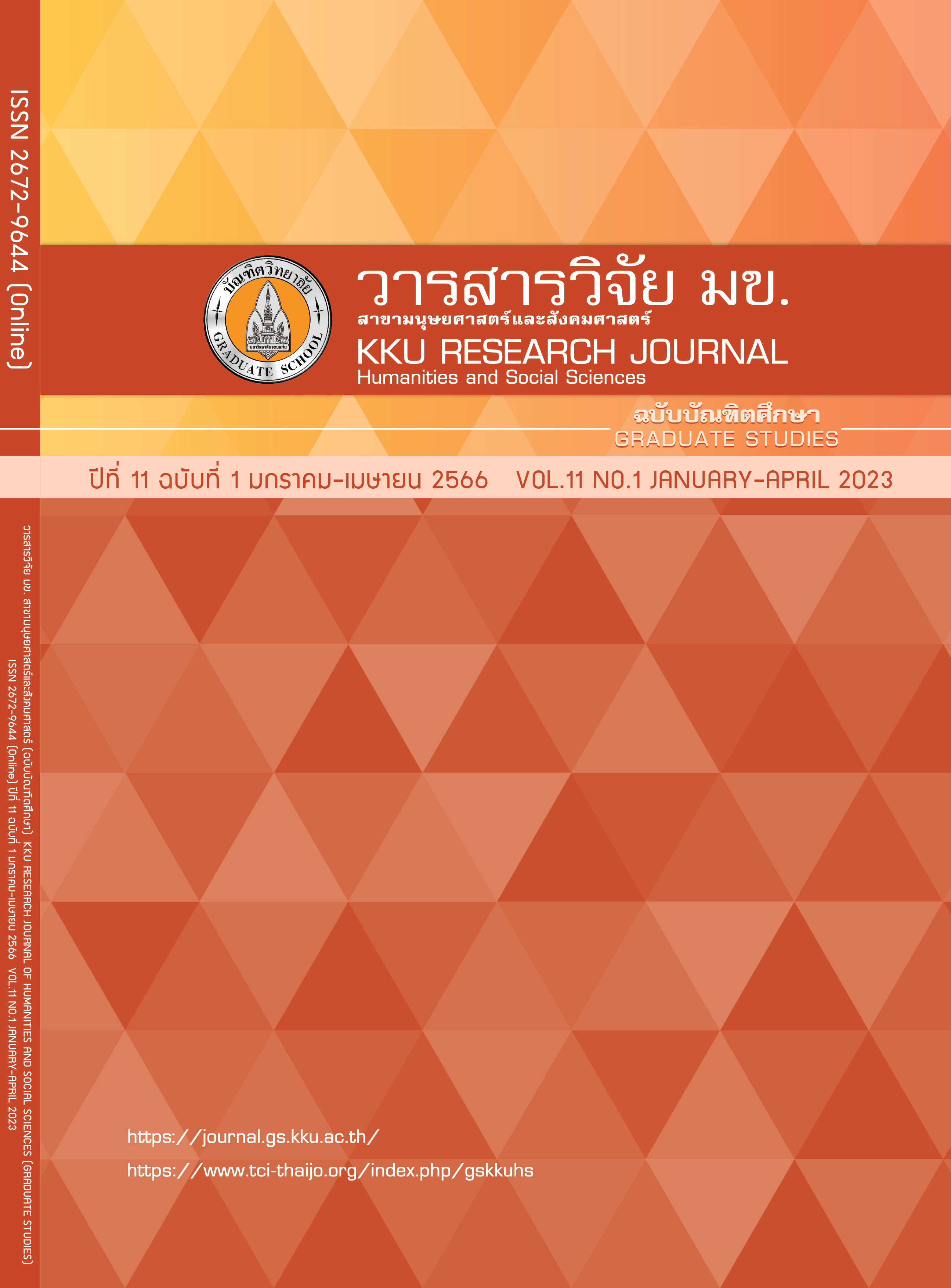บทบาทของผู้บริหารสถานศึกษาปฐมวัยในการพัฒนาเด็กอย่างเป็นองค์รวม บนความรู้ฐานราก 3 มิติ เพื่อการพัฒนาเด็กปฐมวัย
คำสำคัญ:
ผู้บริหารสถานศึกษาปฐมวัย พัฒนาเด็กอย่างเป็นองค์รวม ความรู้ฐานราก 3 มิติบทคัดย่อ
บทบาทของผู้บริหารสถานศึกษาปฐมวัยในการพัฒนาเด็กอย่างเป็นองค์รวมบนความรู้ฐานราก 3 มิติ เพื่อการพัฒนาเด็กปฐมวัย เป็นแนวทางการบริหารงานวิชาการในยุคปัจจุบันที่สถานการณ์ของโลกมีการเปลี่ยนแปลงไปอย่างรวดเร็ว ผู้บริหารสถานศึกษาและผู้ที่มีส่วนเกี่ยวข้องกับการศึกษาปฐมวัยทุกฝ่าย ควรมีความรู้ความเข้าใจและให้การสนับสนุนส่งเสริมทุกฝ่าย เพื่อให้โรงเรียนได้มีการดำเนินงานอย่างมีประสิทธิภาพ ประกอบด้วยวิสัยทัศน์และภารกิจแผนการพัฒนาคุณภาพการศึกษาปฐมวัย เพื่อการพัฒนาเด็กปฐมวัยทั้งในด้านการจัดประสบการณ์การเรียนรู้ และ การอบรมเลี้ยงดูที่สอดคล้องส่งเสริมทักษะในศตวรรษที่ 21 ซึ่งประกอบด้วยทักษะการเรียนรู้และนวัตกรรม ทักษะชีวิตและอาชีพ ทักษะด้านสารสนเทศเทคโนโลยี ที่บูรณาการการอย่างเป็นองค์รวมบนความรู้ฐานราก 3 มิติ ซึ่งประกอบไปด้วย 3 ส่วน คือ 1) พัฒนาการด้านตัวตน (SELF) 2) พัฒนาการด้านทักษะสมอง EF (Executive Function) และ 3) พัฒนาการทั้ง 4 ด้าน
บทบาทหน้าที่ของผู้บริหารจึงเป็นภาระที่สำคัญต่อการจัดการศึกษาปฐมวัยให้มีประสิทธิภาพ ซึ่งผู้บริหารจะต้องรู้เท่าทันการเปลี่ยนแปลง พัฒนาตนเองให้เป็นผู้นำยอดเยี่ยมปรับเปลี่ยนองค์กรให้ทันสมัย พัฒนาทีมงานให้เป็นบุคคลแห่งการเรียนรู้ และเป็น“ผู้บริหารต้องมีอยู่จริง” ในสถานศึกษาเพื่อเป็นบุคคลที่นำแนวทางต่าง ๆ ไปพัฒนาคุณภาพการศึกษาและเป็นผู้นำนโยบายการศึกษาของรัฐไปสู่การปฏิบัติ เพื่อพัฒนาสถานศึกษา ครู บุคลากร และเด็กให้มีคุณภาพ โดยบริหารจัดการสถานศึกษาให้เป็นไปตามมาตรฐานของสถานศึกษาที่มีประสิทธิภาพและประสิทธิผลตามยุคตามสมัยที่มีการเปลี่ยนแปลงไป
ผู้บริหารโรงเรียนที่มีประสิทธิภาพจะต้องมีทักษะในการปฏิบัติงานและมีความสามารถในการแก้ปัญหาที่ซับซ้อน ถ้าผู้บริหารโรงเรียนขาดทักษะภาวะผู้นำก็จะไม่สามารถแก้ไขปัญหาของโรงเรียนได้ ซึ่งทักษะภาวะผู้นำต้องอยู่บนพื้นฐาน ของความเข้าใจเกี่ยวกับภาระงานและบุคคลลากร ผู้บริหารโรงเรียนจึงต้องได้รับการสนับสนุนให้ได้รับการพัฒนาทักษะ ความรู้ และประสบการณ์ในการปฏิบัติงานเพื่อเตรียมความพร้อมสำหรับการแข่งขันในบริบทของโลกยุคใหม่ในปัจจุบัน เราอยู่ในยุคของการเปลี่ยนแปลงทางสังคมและการมีทัศนะระดับโลก จึงสามารถกล่าวได้ว่าบทบาทของผู้นำยอดเยี่ยมนั้นควรมี กรอบความคิดเชิงปฏิวัติในการมองความสัมพันธ์ระหว่างบุคลากรในสถานศึกษาใหม่ เป็นความสัมพันธ์ของผู้คนที่มีความแตกต่างกันมากขึ้น (More diverse people) ในกระบวนการบริหารกำกับดูแลร่วมกันที่แท้จริง จากกระบวนการบริหาร การเปลี่ยนแปลงในกระบวนทัศน์เก่าสู่กระบวนทัศน์ใหม่บนพื้นฐานแนวคิดที่ทันสมัยในปัจจุบัน ทำให้ค่อย ๆ คืบไปสู่บทบาทของผู้นำที่ยอดเยี่ยมมีลักษณะสำคัญ ด้าน การรับฟังการสะท้อนผลของบุคลากรในสถานศึกษา การยึดค่านิยมเป็นศูนย์กลางหรือการยึดอุดมการณ์เป็นสำคัญในการบริหารขับเคลื่อนพัฒนาสถานศึกษา (value centered) การมีทัศนะระดับโลกเพื่อการพัฒนาสถานศึกษา (global in perspective) และ การเป็นอำนวยความสะดวกต่อสุนทรียะสนทนากับบุคลากรทุกคนในสถานศึกษา (dialogue)
เอกสารอ้างอิง
Smahito C. Project-Based Learning for the Early Childhood Education. Bangkok: Cyber Print Group; 2020.
Nopmaneejomraslert K. et al. Quality of Life in Early Childhood. Academic Research Center Project for Child and Family Development. National Institute for Child and Family Development [thesis]. Bangkok: Mahidol University. Bangkok: BKK Pro Co., Ltd; 2016. Thai.
Lee DM. Essential Skills for Potential School Administrators: A Case. 2008.
McLeod R, Chell G. Management information systems. 10th ed. Upper Saddle River, NJ: Prentice Hall; 2006.
Ministry of Education. National Standards of Early Childhood Education and Basic Education, Special Education Center [Internet]. 2017. Available from: http://www.kroobannok.com/85280
Tanasettakorn P. EF skills and Early Childhood Development in Handout of EX Executive Functions Development for Early Childhood Teachers. Bangkok: Matichon Public Company Limited; 2018.
Tanasettakorn P. EF + SELF, essential skills for the early childhood [Internet]. Available from: https://www.bangkokbiznews.com/social/900854
Rotanit S. Teaching Publication entitled Principles and Theories of Education Administration. 2nd ed. Bangkok: Khaofang; 2010.
Wansin S. Development of School System to Renovate Learning Process. Bangkok: Edison Press Products. 1997; 11(4): 12-17. Thai.
National Standard for Early Childhood Care, Development and Education Thailand B.E. 2561 [Internet]. 2018. Available from: https://apps.hpc.go.th
ดาวน์โหลด
เผยแพร่แล้ว
รูปแบบการอ้างอิง
ฉบับ
ประเภทบทความ
สัญญาอนุญาต

อนุญาตภายใต้เงื่อนไข Creative Commons Attribution-NonCommercial-NoDerivatives 4.0 International License.




